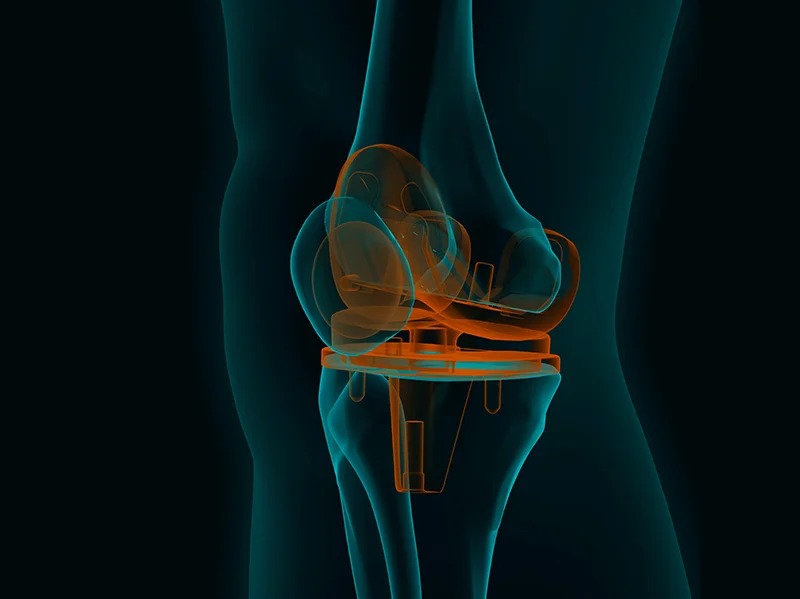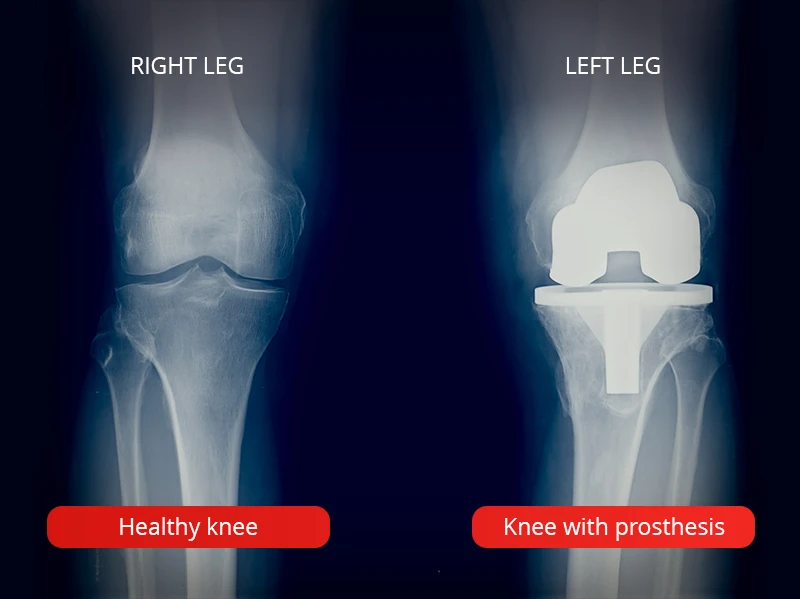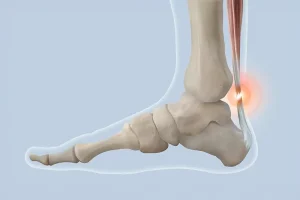Total knee replacement
Regain your mobility and joint comfort with a safe and effective surgical solution
Home » Orthopedic Surgery » Total knee replacement
Conditions Treated

If knee pain has changed your lifestyle, limiting your movements and affecting your well-being, know that you are not alone. Many patients end up feeling frustrated, tired, and even hopeless when conservative treatments no longer work. In such cases, total knee replacement can be more than just a medical option – it can be a real chance to enjoy freedom, movement, and life again.
At our clinic, we emphasize empathetic, personalized, and professional care. We use modern surgical techniques, including minimally invasive procedures, to provide our patients with a quick, comfortable recovery and long-term results.
Book an Appointment
What is total knee replacement?
Total knee replacement is a surgical procedure in which the knee joint is replaced with an artificial prosthesis. The goal is to restore joint alignment and function, as well as reduce pain.
It is recommended for those suffering from advanced degenerative conditions who no longer respond to other forms of treatment.
Causes that may lead to the need for a knee replacement
Knee joint wear can occur over time, and sometimes it sets in faster than we would expect. Among the most common causes are:
- Severe osteoarthritis (gonarthrosis): The most common cause, characterized by progressive destruction of the articular cartilage;
- Traumatic injuries: Fractures, dislocations, or other trauma affecting knee stability;
- Inflammatory conditions: Such as rheumatoid arthritis;
- Overweight: Which accelerates joint degradation through constant overuse;
- Genetic factors and aging: The incidence increases significantly after 50-60 years of age.

Symptoms that may indicate the need for a knee replacement
Signs that may suggest it is time to consider surgery include:
- Persistent pain: Pain that does not respond to medication and affects sleep or daily activities;
- Limited mobility: Difficulty climbing or descending stairs, bending over, or walking short distances;
- Joint stiffness: Feeling that the knee is locked;
- Instability: Feeling that the knee is giving way under weight;
- Chronic inflammation: Recurrent swelling around the joint.
Diagnosing the need for a knee replacement
We ensure that every decision is made based on careful evaluation. This includes:
Detailed clinical examination
For assessing knee mobility, pain, and stability.
Imaging investigations
- X-rays: To observe the degree of joint wear;
- MRI: To evaluate soft tissues such as menisci or ligaments;
- CT: If a personalized surgical plan is required.
Types of surgical procedures
Depending on the severity of the condition, the following options are available:
- Total knee replacement: This involves replacing all joint components – femoral, tibial, and sometimes patellar. It is the most common procedure for advanced osteoarthritis.
- Partial knee replacement: Used when the damage is limited to a single compartment of the knee. It is a less invasive procedure with a shorter recovery time.
- Minimally invasive approach: Can be used in some cases and involves smaller incisions and less damage to the tissues. The main advantage is faster and less painful recovery.
When is knee replacement surgery recommended?
This intervention is recommended:
After the failure of conservative treatments, such as:
- Anti-inflammatory drugs;
- Intra-articular injections of corticosteroids or hyaluronic acid;
- Physical therapy and strengthening exercises.
In advanced cases of osteoarthritis, especially if:
- The pain is severe and constant;
- Mobility is significantly limited;
- The condition is aggravated by increased body weight, a history of trauma, or intense physical activity.
Contraindications
Knee replacement is not recommended in the following situations:
- Poor general health: Which does not allow for major surgery;
- Active infections: Systemic or localized in the knee;
- Severe skin conditions: Which may increase the risk of postoperative infection.

Possible risks and complications
As with any surgical procedure, complications may occur, but they are rare and manageable:
- Postoperative infections: Treatable if detected early; sometimes may require replacement of the prosthesis;
- Joint stiffness: Can be improved with physical therapy;
- Hematomas: Resolve over time or may require drainage;
- Residual pain: Usually controllable with pain medication;
- Blood clots: Prevented with medication and early mobilization.
Good preoperative preparation (quitting smoking, controlling diabetes, losing weight) and an attentive medical team can significantly reduce these risks.
Advantages of total knee replacement
After the procedure, most patients notice:
- Significant reduction in pain;
- Improved joint function;
- Increased mobility and independence in daily activities;
- Long-term improvement in quality of life.
Recovery after surgery
The recovery process is essential for long-term success:
- Intensive physical therapy: Begins shortly after surgery and continues for several months;
- Regular medical check-ups: To monitor progress and adjust treatment;
- Following recommendations: Adequate rest, balanced diet, and avoiding overexertion of the operated knee.
We are here to help you
If you suffer from persistent knee pain, don’t wait for it to get worse. We invite you to contact us for a consultation, to discuss openly, with empathy and professionalism. Together we will find the best treatment solution.
Medical Team
Frequently Asked Questions
How long does recovery take after knee replacement surgery?
Full recovery can take between 3 and 6 months, depending on age, overall health, and how well the recovery program is followed.
How long does a knee replacement last?
A knee replacement has an average lifespan of 15 to 20 years, depending on the type of prosthesis, the patient’s activity level, and compliance with medical recommendations.
How long does knee surgery take?
Surgery for total knee replacement takes approximately 1 to 2 hours. Including preparation and post-operative monitoring, the patient stays in the hospital for 3 to 5 days.
What are the risks of knee replacement surgery?
Like any major surgery, this procedure carries certain risks: infection, blood clots, joint stiffness, persistent pain, or premature wear of the prosthesis.
What am I not allowed to do after the operation?
Strenuous activities, running, lifting heavy weights.
Is denture recommended for seniors over 75 years of age?
Yes, if your general health allows the procedure.
What does a prosthesis revision involve?
Replacement of worn or damaged prostheses through a new surgical procedure.








